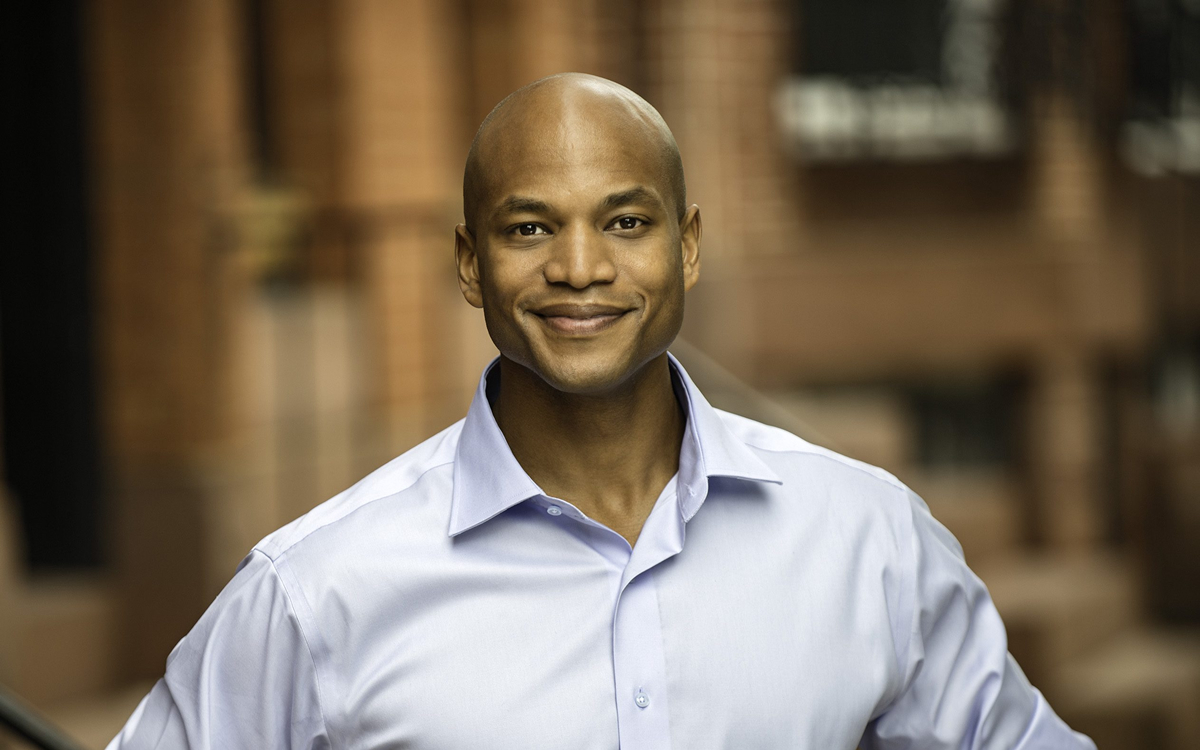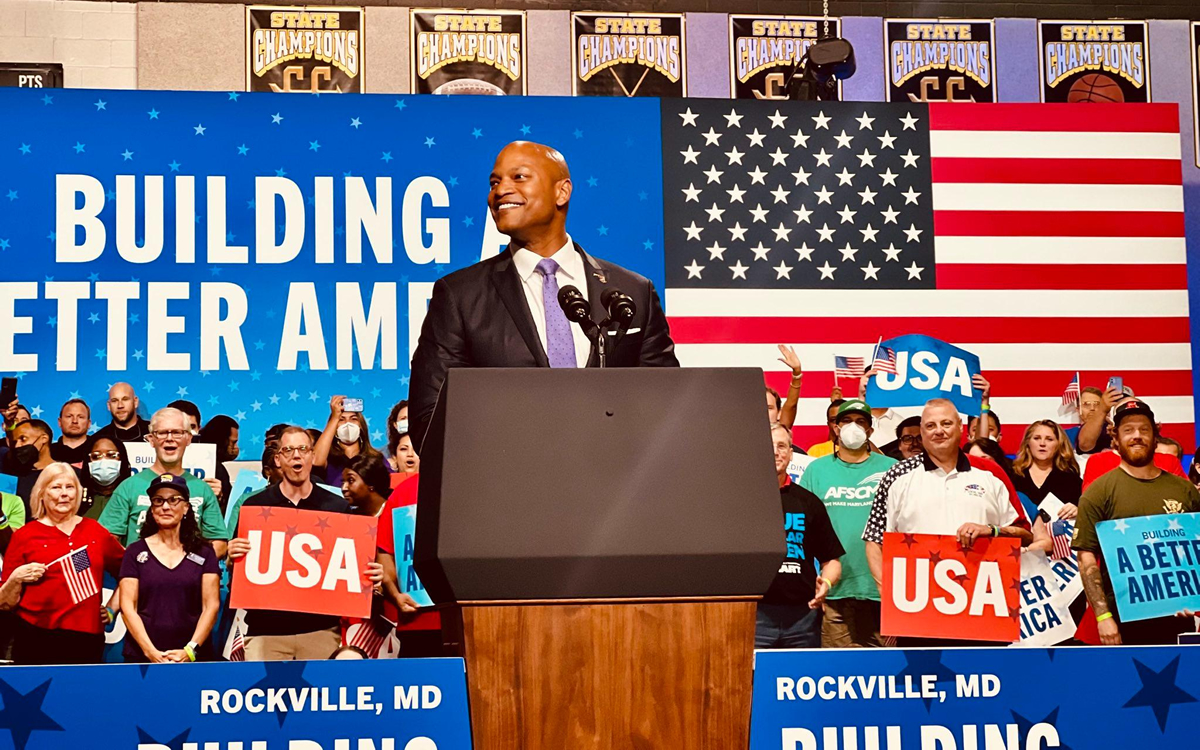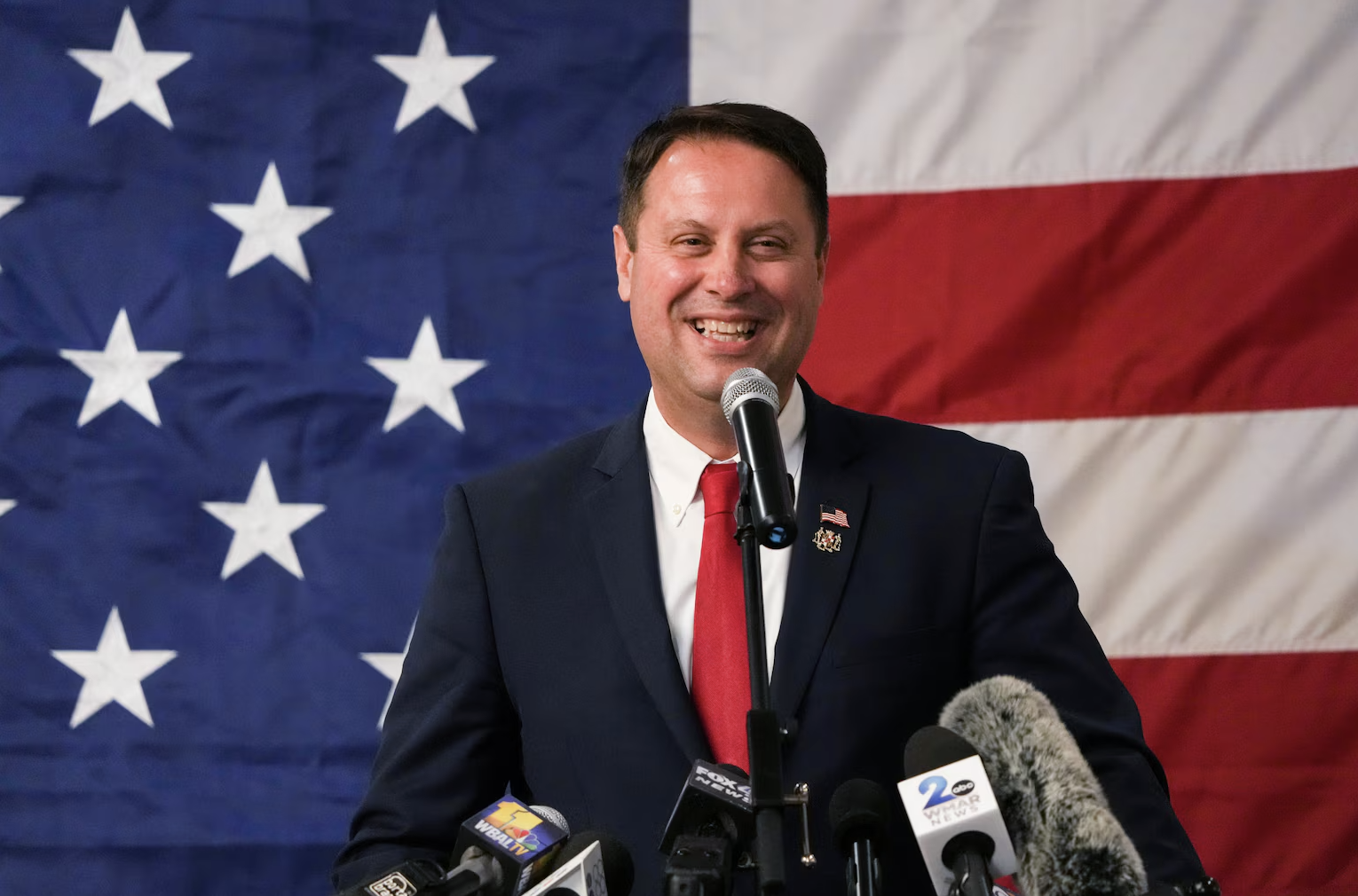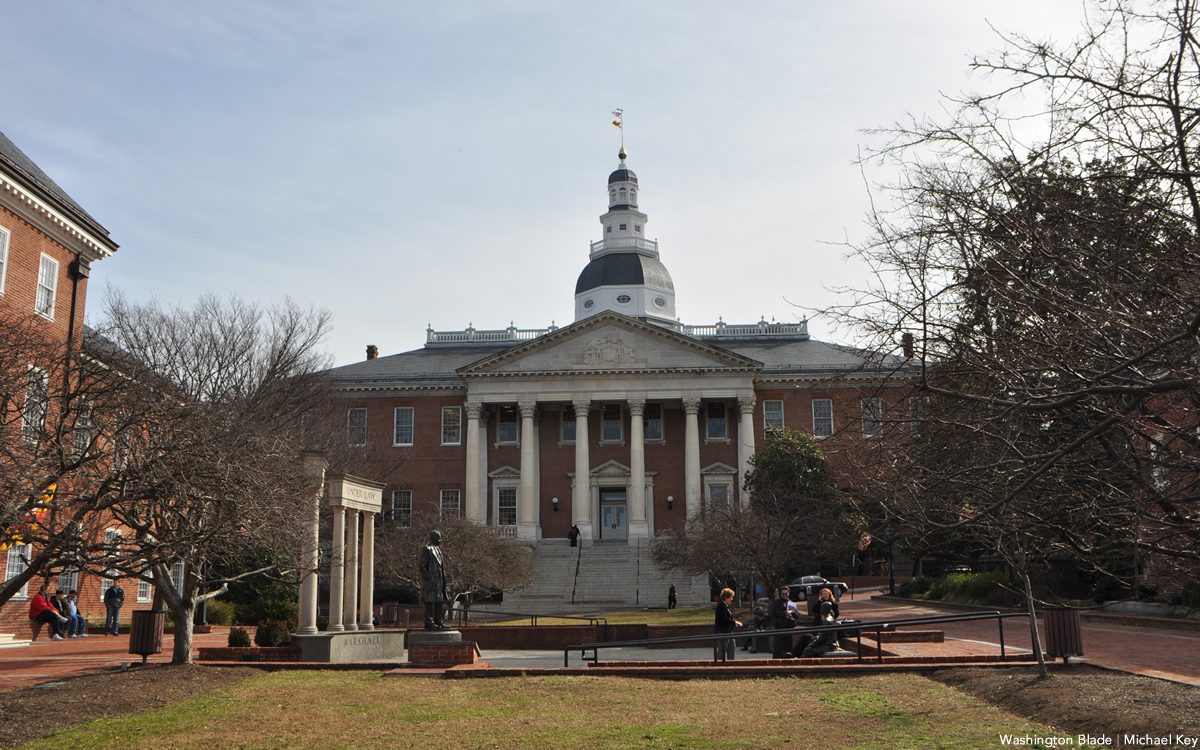Maryland
Moore expresses strong support for LGBTQ rights in Md. guv race
Democratic candidate backs full access for trans students in public schools

Since he launched his campaign for governor of Maryland earlier this year Democratic candidate Wes Moore has posted a page on his campaign website describing in detail his strong support for LGBTQ rights.
In a phone interview with the Washington Blade on Oct. 17, Moore said his Republican opponent, Dan Cox, has argued that those who support the rights of transgender students in the state’s public schools are advancing an agenda of “indoctrination” for school kids, a claim that Moore strongly disputes.
Cox, who was endorsed by Donald Trump after supporting the false claim that Trump won the 2020 presidential election, has been an opponent of LGBTQ rights, especially transgender rights. He currently serves as a member of the Maryland House of Delegates from Frederick and Carroll Counties.
“He has been very clear that he believes, when talking about our trans youth or trans children, that there should be extra restrictions put against them for being who they are,” Moore told the Blade. “So, my opponent and I, there cannot be a more stark difference in the way that we view the world, in the way that we view support for the LGBTQ+ community,” Moore said.
“I care deeply about the LGBTQ+ community,” he said. “And we’re always going to fight to ensure that Maryland is a state that is open and welcome to all, regardless of who you are, regardless of who you love.”
Moore began his career in the military, serving as a captain and paratrooper with the U.S. Army’s 82nd Airborne Division leading soldiers in combat in Afghanistan, according to his campaign biography. Upon returning home to Maryland Moore started a Baltimore-based small business and wrote a best-selling book called, “The Other Wes Moore,” before joining the nonprofit Robin Hood foundation, where he later became CEO.
Moore captured the Democratic nomination in July after emerging as the winner in a hotly contested primary, finishing ahead of four prominent political figures – Maryland comptroller Peter Franchot, former Democratic National Committee chair Tom Perez, former Education Secretary John King, and former Maryland Attorney General Doug Gansler.
A Washington Post-University of Maryland poll released on Oct. 1 showed Moore was leading Cox in a sample of 810 Maryland registered voters by a margin of 60 percent to 28 percent, with 9 percent saying they were undecided.
Moore told the Blade that among his priorities, if elected governor, will be to strictly enforce the Inclusive Schools Act, a law passed earlier this year by the Maryland General Assembly that bans discrimination in the state’s public schools based, among other areas, on sexual orientation and gender identity.
He said he would also call on the General Assembly to pass the Trans Health Equity Act, a bill that died in committee earlier this year. The bill calls for providing Medicaid coverage for gender-affirming treatment defined as any medically necessary treatment prescribed by a licensed health care provider for the treatment of a condition related to someone’s gender identity.
“And I think the thing that people will see is that this is not just a new thing to me,” Moore said. “We have a track record on working on these issues, whether it is the work I did on the repeal of ‘Don’t Ask, Don’t Tell,’ whether it is the work I did when I was running one of the largest poverty-fighting organizations in the country, and supporting organizations that were supporting LGBTQ plus homeless youth,” he said.
A transcript of the Blade interview with Wes Moore follows:
Washington Blade: Thank you, Mr. Moore, for doing this interview. Do you have any opening remarks before we get into some questions?
Wes Moore: Well one, thank you for making this time to do this. The only opening remarks I would have is, we’re excited about running this race because we have a leave no one behind agenda. And the leave no one behind agenda that we brought out really started in my days in the military, where we were taught that in our first days of military training there was a mantra that they asked us to live by. And it was leave no one behind. And that will be the new mission of the State of Maryland.
And when I say that I mean everybody. I care deeply about the LGBTQ+ community. And we’re always going to fight to ensure that Maryland is a state that is open and welcome to all, regardless of who you are, regardless of who you love.
And I think the thing that people will see is that this is not just a new thing to me. We have a track record on working on these issues, whether it is the work I did on the repeal of ‘Don’t Ask, Don’t Tell,’ whether it is the work I did when I was running one of the largest poverty fighting organizations in the country, and supporting organizations that were supporting LGBTQ+ homeless youth.
So, what you are going to see in our administration is really the continuation of the kind of work that we have been doing for years. And a commitment to making sure we’re leaving no one behind in the process.
Blade: Your campaign website includes a full page in which you express strong support for the LGBTQ community and equal rights for LGBTQ people. Has your Republican opponent, Dan Cox, or any of his supporters criticized you or attacked you for that?
Moore: Of course. The thing that I continue to focus on is that level of bigotry, it has no place in our campaign. It will have no place in our administration. You know, my opponent has been very clear about who he is. My opponent has been very clear in that he considers the push that we have to make sure that all voices are supported and heard, especially and including our LGBTQ+ youth, is quote unquote indoctrination.
He has been very clear that he believes, when talking about our trans youth or trans children, that there should be extra restrictions put against them for them being who they are. So, my opponent and I, there cannot be a more stark difference in the way that we view the world, in the way that we view support for the LGBTQ+ community.
But the reason that I know that our campaign has the momentum that it does is not because we are asking people to be afraid of the alternative. But it is asking people to believe in what we can actually get done together.
Blade: What message do you have for any LGBTQ voters in Maryland, some of whom are Republicans and support the current governor, who are undecided about whether to vote for you because they think you might be too liberal?
Moore: The message that I would send people is that we’re building a future for all Marylanders. And we’re going all around the state. In fact, later on today we’re on our way to Washington County, to Frederick County – to places that are pretty conservative areas. And people are saying, why are you going there if there are not a lot of Democrats out there? My answer is simple: It’s because there’s a lot of Marylanders. And I’m planning on being their governor too.
You know, when I was in the Army and leading soldiers in combat, one question I never wanted to ask my soldiers is, what’s your political party? It didn’t matter. We had one goal and one job and one mission.
When we were fighting for both the repeal of “Don’t Ask, Don’t Tell” or most recently for the for the PACT Act, which was supporting people who were exposed to these toxic burning bits and making sure that they are getting support, never once was the conversation that we’re focusing on about Democrats that need support or focusing on Democrats that were having their civil rights violated by the “Don’t Ask, Don’t Tell” law that was in place.
We wanted to support everybody. And so, the message I would have to Republicans who might support Governor Hogan and who are now trying to figure out what they want to do because they’re also very clear that Governor Hogan is not supporting my opponent. Governor Hogan has called him unfit. He has called him unstable. He has said he is not only not going to support him for governor, but he has also said I won’t even give him a tour of the governor’s office.
So, Governor Hogan has been very clear about his displeasure with my opponent. But the thing that I would say also to Republicans who are trying to figure out what they want to do in this election is, I humbly ask them for their support. And I humbly ask them to look at our policy page. And I think they will see in our policy page that we are focused on building a Maryland for everyone and not just some and not for a political party.
Blade: What are your thoughts on Virginia Gov. Glenn Youngkin and the controversial policy proposals he has made for transgender students in the Virginia public school system? His proposed school guidelines call for repealing the existing transgender school policy put in place by former Gov. Ralph Northam that allowed transgender students to use the name of their choosing and to use school facilities such as bathrooms that match their gender identity. This has become what many are saying is a wedge issue in Virginia. Do you have any thoughts on how this might play out in Maryland?
Moore: I have an 11-year-old daughter and an eight-year-old son. And the only thing that I ever want for my kids is for them to be heard and for them to be seen. And the thing is that’s what I want for every kid. That’s what I want for all children in the State of Maryland. And the danger of so many of these policies is, you know, if we’re asking our children to live lives of honor and lives of integrity but then we are also putting together policies that are restricting them from being able to live their own truth, then I have an issue with that.
I know in the State of Maryland, our policy and our positions are that we’re going to fully support students who identify as LGBTQ+. And we’re going to fully implement the Inclusive Schools Act, which ensures Maryland schools adopt LGBTQ+ affirming policies and creating partnerships with organizations. That we are going to support the passage of the Trans Health Equity Act ensuring transgender Marylanders receive the gender affirming health care that they need.
That we are going to abolish some of these outdated laws that criminalize HIV. So, we are going to make sure that Maryland is going to be an inclusive state, a state where people feel welcome and a state where we’re asking people to be comfortable with who they are. And to know that you’re going to have a state that ultimately enforces it.
Blade: You have said you will advocate for the passage of the Trans Health Equity Act, which died in the Maryland General Assembly this year for various reasons. Can you say a little about what you might do to urge the General Assembly to pass that next year?
Moore: Well, I think that bills require leadership. And we’ve had a General Assembly that has really been strong and heroic on a collection of different issues. But they’ve had to lead in conditions where – they haven’t had to just worry about do they have enough votes for passage. They’ve had to lead to worry about do we have enough votes for overrides. And the assurance that I’m going to get from the legislature is those days are long gone, because in January they’re going to have a partner in the Moore-Miller administration. They’re going to have an administration that’s going to work in partnership with the legislature to know that the bills we’re putting together, the issues that we’re working on, that we’re working on them together.
So that when they make it to my desk, it’s not going to be the first time that I’ve seen it. And so that’s some of the things that we’re going to do that will support the leadership that I think is going to be required and necessary in order to partner with the legislature.
Blade: Is there anything I didn’t ask you that you think people should know about regarding what you’re planning to do as governor?
Moore: You’ve asked good questions. The only thing I would say is with our leave no one behind agenda that we have in the campaign and that we will have in the administration, it is rock solid. And it’s making sure that everybody – and because we have an inclusive state, we are going to have an inclusive government. And I think when people look at our administration, and whether it’s cabinet secretaries, agency heads, etcetera, we are going to have an administration that looks like the State of Maryland.
And so, I’m excited for everybody to include our LGBTQ youth and individuals, that when they look at the Moore-Miller administration, they’re going to be able to look up and see themselves, and that matters.

Maryland
4th Circuit dismisses lawsuit against Montgomery County schools’ pronoun policy
Substitute teacher Kimberly Polk challenged regulation in 2024

A federal appeals court has ruled Montgomery County Public Schools did not violate a substitute teacher’s constitutional rights when it required her to use students’ preferred pronouns in the classroom.
The 4th U.S. Circuit Court of Appeals in a 2-1 decision it released on Jan. 28 ruled against Kimberly Polk.
The policy states that “all students have the right to be referred to by their identified name and/or pronoun.”
“School staff members should address students by the name and pronoun corresponding to the gender identity that is consistently asserted at school,” it reads. “Students are not required to change their permanent student records as described in the next section (e.g., obtain a court-ordered name and/or new birth certificate) as a prerequisite to being addressed by the name and pronoun that corresponds to their identified name. To the extent possible, and consistent with these guidelines, school personnel will make efforts to maintain the confidentiality of the student’s transgender status.”
The Washington Post reported Polk, who became a substitute teacher in Montgomery County in 2021, in November 2022 requested a “religious accommodation, claiming that the policy went against her ‘sincerely held religious beliefs,’ which are ‘based on her understanding of her Christian religion and the Holy Bible.’”
U.S. District Judge Deborah Boardman in January 2025 dismissed Polk’s lawsuit that she filed in federal court in Beltsville. Polk appealed the decision to the 4th Circuit.

By PAMELA WOOD | Dan Cox, a Republican who was resoundingly defeated by Democratic Gov. Wes Moore four years ago, has filed to run for governor again this year.
Cox’s candidacy was posted on the Maryland elections board website Friday; he did not immediately respond to an interview request.
Cox listed Rob Krop as his running mate for lieutenant governor.
The rest of this article can be found on the Baltimore Banner’s website.
Maryland
Expanded PrEP access among FreeState Justice’s 2026 legislative priorities
Maryland General Assembly opened on Jan. 14

FreeState Justice this week spoke with the Washington Blade about their priorities during this year’s legislative session in Annapolis that began on Jan. 14.
Ronnie L. Taylor, the group’s community director, on Wednesday said the organization continues to fight against discrimination against people with HIV/AIDS. FreeState Justice is specifically championing a bill in the General Assembly that would expand access to PrEP in Maryland.
Taylor said FreeState Justice is working with state Del. Ashanti Martinez (D-Prince George’s County) and state Sen. Clarence Lam (D-Arundel and Howard Counties) on a bill that would expand the “scope of practice for pharmacists in Maryland to distribute PrEP.” The measure does not have a title or a number, but FreeState Justice expects it will have both in the coming weeks.
FreeState Justice has long been involved in the fight to end the criminalization of HIV in the state.
Governor Wes Moore last year signed House Bill 39, which decriminalized HIV in Maryland.
The bill — the Carlton R. Smith Jr. HIV Modernization Act — is named after Carlton Smith, a long-time LGBTQ activist known as the “mayor” of Baltimore’s Mount Vernon neighborhood who died in 2024. FreeState Justice said Marylanders prosecuted under Maryland Health-General Code § 18-601.1 have already seen their convictions expunged.
Taylor said FreeState Justice will continue to “oppose anti anti-LGBTQ legislation” in the General Assembly. Their website later this week will publish a bill tracker.
The General Assembly’s legislative session is expected to end on April 13.



















